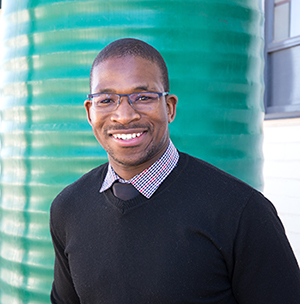Latest News Archive
Please select Category, Year, and then Month to display items
05 April 2021
|
Story Dr Nitha Ramnath
|
Photo Supplied
 Jamba Isaac Ulengo.
Jamba Isaac Ulengo.
François van Schalkwyk and Keenan Carelse, UFS alumni leading the university’s United Kingdom Alumni Chapter, have put their voices together to produce and direct the podcast series. Intended to reconnect alumni with the university
and their university experience, the podcasts will be featured on the first Monday of every month, ending in November 2021. Our featured alumni share and reflect on their experiences at the UFS, how it has shaped their lives, and relate
why their ongoing association with the UFS is still relevant and important. The podcasts are authentic conversations – they provide an opportunity for the university to understand and learn about the experiences of its alumni and to celebrate
the diversity and touchpoints that unite them.
Our podcast guest
Born in the North West town of Vryburg, Ulengo first played provincial rugby at the U16 Grant Khomo Week in 2005. While attending Jim Fouché High School in Bloemfontein, Ulengo was chosen to represent the Free State at various youth levels. As
an up-and-coming player, Ulengo made his break via the FNB Varsity Cup Competition where he starred for the Shimlas, scoring 11 tries in 18 appearances over the three seasons between 2010 and 2012. A short stint with the Free State Vodacom Cup side
saw him make his debut for the Blitzboks (Glasgow 2012), followed by a tournament at the London Sevens in 2014. Ulengo has been a prominent member of the South African Sevens since making his debut for the team in the Scotland leg of the 2011-2012
IRB Sevens World Series. He played in the two final tournaments of that season and then signed a two-year contract with the South African Rugby Union to represent the team in the 2012-2013 and 2013-2014 series. While he only competed at four events
in his first full season, he was involved in seven of the tournaments in his second season.
Ulengo made his return to the sport by signing a contract to play Currie Cup rugby for the Pretoria-based Blue Bulls in 2014 and for their Super Rugby franchise, the Bulls, from the 2015 Super Rugby season.
University of the Free State strives towards going ‘green’
2017-08-07

Benedict Mochesela from University Estates on the
UFS Bloemfontein Campus. A total of thirty brand-new
water storage tanks, between 5 000 and 20 000 litres,
were installed.
Photo: Anja Aucamp
Eight provinces, including the Free State, were declared disaster areas last year due to the ongoing drought. This had a devastating effect on the agricultural sector, leaving many communities dry.
University Estates at the University of the Free State found an ideal project to make university buildings greener. A total of thirty water storage tanks, varying in size from 5 000 to 20 000 litres, were installed at various buildings on the Bloemfontein Campus. As a pilot phase, these tanks were specifically installed at residences and buildings with high traffic volumes.
Importance of water tanks at the UFS
According to Benedict Mochesela, Project Manager of this initiative, the purpose of the project is to harvest rainwater, which will be used during emergencies when the campus does not have water and the emergency water storage facility is depleted. “This water is not intended for drinking, but for the flushing of toilets,” says Mochesela.
He mentioned that the water will also be used for watering flowerbeds and gardens when the water has been standing for a long time without being used.
Recycling water: An initiative to protect the environment
A number of water storage tanks are already in place at the Qwaqwa Campus and a preliminary phase of using grey water from residences is currently ongoing at the South Campus. Grey water is made up of bath, shower, and bathroom sink water. The water is reused for toilet flushing as well as for irrigation purposes.
“Recycling of water is one of a number of initiatives the university intends to undertake to ensure and show the community that this institution remains conscious of the environment and to changes which we continuously need to adapt to.”